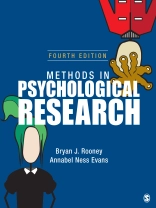Methods in Psychological Research introduces students to the rich world of research in psychology through student-friendly writing, compelling real-world examples, and frequent opportunities for practice. Using a relaxed yet supportive tone that eases student anxiety, the authors present a mixture of conceptual and practical discussions, and spark reader interest in research by covering meaningful topics that resonate with today’s students. In-text features like Conceptual Exercises, FYI sections, and FAQ sections with accompanying visual cues support learning throughout the research experience. The Fourth Edition equips students with the tools they need to understand research concepts, conduct their own experiments, and present their findings.
Daftar Isi
Preface
Acknowledgments
About the Authors
About the Contributors
Chapter 1. Introduction to Research in Psychology
Acquiring Knowledge About the World
Conceptual Exercise 1A
Psychology—Science and Art
Critical Thinking
Objectives of Science
The Tenets of Science
Conceptual Exercise 1B
The Scientific Method
Theories, Concepts, and Hypotheses
Why We Do Research
Approaches to Research
Steps in Planning and Doing Research
Conceptual Exercise 1C
Chapter Summary
Chapter Resources
Chapter 2. Understanding the Research Literature
Searching the Literature
The Research Article
Conceptual Exercise 2A
Basic Statistical Procedures
Conceptual Exercise 2B
More Complex Statistical Procedures
Chapter Summary
Chapter Resources
Chapter 3. Research in Psychology: An Ethical Enterprise
Are Ethical Codes Necessary?
General Principles
Conceptual Exercise 3A
Ethical Standards
Conceptual Exercise 3B
Conceptual Exercise 3C
Conceptual Exercise 3D
Conceptual Exercise 3E
Special Populations
Internet Research
Bias and Intellectual Honesty
Chapter Summary
Chapter Resources
Chapter 4. Hypothesis Testing, Power, and Control: A Review of the Basics
Three Levels of Hypotheses
Conceptual Exercise 4A
Testing the Null Hypothesis
Statistical Significance
Inferential Errors: Type I and Type II
Conceptual Exercise 4B
Power and How to Increase It
Effect Size
The Role of Replication in Research
Conceptual Exercise 4C
External and Internal Validity
Conceptual Exercise 4D
Chapter Summary
Chapter Resources
Chapter 5. Measuring Variables
Ways of Asking Questions
Conceptual Exercise 5A
Social Desirability and Response Set
Measuring Observed Behavior
Conceptual Exercise 5B
Conceptual Exercise 5C
The Importance of Precision in Measurement
Conceptual Exercise 5D
Tests, Scales, and Inventories
Commercially Available Tests and Inventories
Chapter Summary
Chapter Resources
Chapter 6. Selecting Research Participants
Sampling Methods
Conceptual Exercise 6A
Conceptual Exercise 6B
Conceptual Exercise 6C
Recruitment
Sample and Effect Size
Power Revisited
Chapter Summary
Chapter Resources
Chapter 7. Experimental Design: Independent-Groups Designs
Why We Do Experiments
Conceptual Exercise 7A
Where We Do Experiments
Conceptual Exercise 7B
How We Do Experiments: Independent-Groups Designs
Chapter Summary
Chapter Resources
Chapter 8. Experimental Design: Dependent-Groups and Mixed Designs
Dependent-Groups Designs
Conceptual Exercise 8
Mixed Designs
Chapter Summary
Chapter Resources
Chapter 9. Experimental Design: Single-Participant Designs/The Operant Approach
Single-Participant Design and the Experimental Analysis of Behavior
Concepts in the Experimental Analysis of Behavior
ABA and ABAB Withdrawal Designs
Conceptual Exercise 9A
Multiple-Baseline Design
Alternating-Treatment Design
Changing-Criterion Design
Conceptual Exercise 9B
Advantages and Disadvantages of Single-Participant Designs
Chapter Summary
Chapter Resources
Chapter 10. Nonexperimental Research: Finding Relationships Among Variables
Quasi-Experiments
Conceptual Exercise 10A
Conceptual Exercise 10B
Conceptual Exercise 10C
Longitudinal Research
Cross-Sectional Research
Conceptual Exercise 10D
Case Studies
Correlational Research
Conceptual Exercise 10E
Chapter Summary
Chapter Resources
Chapter 11. Data Collection Methods
Observational Research: Observing the Behavior of Individuals
Advantages and Disadvantages of Observational Research
Conceptual Exercise 11A
Survey Research: Asking People Questions About Their Behavior
Conceptual Exercise 11B
Conceptual Exercise 11C
Observing Group Behavior: The Focus Group
Chapter Summary
Chapter Resources
Chapter 12. Program Evaluation, Archival Research, and Meta-Analytic Designs
Program Evaluation
Conceptual Exercise 12A
Conceptual Exercise 12B
Archival Research
Conceptual Exercise 12C
Meta-Analysis
Chapter Summary
Chapter Resources
Chapter 13. Analyzing, Interpreting, and Summarizing Research Data
What Are Statistics, and Why Are They Necessary?
Summarizing Your Data With Descriptive Statistics
Conceptual Exercise 13A
Conceptual Exercise 13B
Testing the Statistical Significance of Your Research Findings
Conceptual Exercise 13C
Chapter Summary
Chapter Resources
Chapter 14. Communicating in Psychology
Writing in Psychology
Conceptual Exercise 14A
Conceptual Exercise 14B
Conceptual Exercise 14C
Conceptual Exercise 14D
Conceptual Exercise 14E
Conceptual Exercise 14F
Conceptual Exercise 14G
Conceptual Exercise 14H
Presenting Research in Writing
Other Ways of Presenting Research
Chapter Summary
Chapter Resources
Glossary
References
Index
Tentang Penulis
Annabel Ness Evans received her Ph D in cognitive psychology from the University of Alberta in 1979.She was the Chair of the Department of Psychology at Concordia University of Edmonton from 1975 until 2013, when she retired as Professor Emerita to muddle about in her garden, ski her brains out, and basically have a really good time.She has written two previous texts. Her Using Basic Statistics in the Behavioral and Social Sciences (2014) is in its fifth edition and is available from Sage. She has coauthored a book, Principles of Behavior Analysis (1994), with Lyle Grant. Annabel’s sons, Christiaan, Marcus, and Luke, are grown and on their own so she lives with her Havanese dog, Skye, who has shown a notable lack of interest in psychological research.












